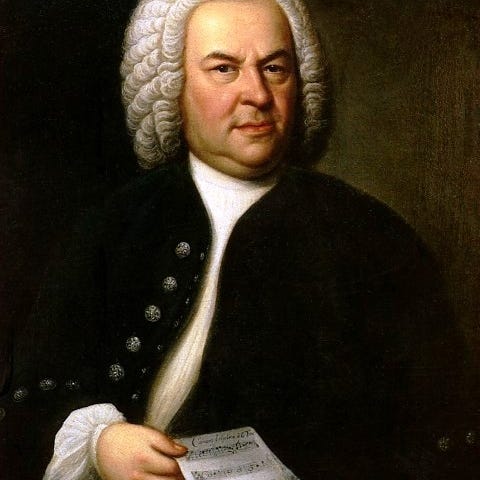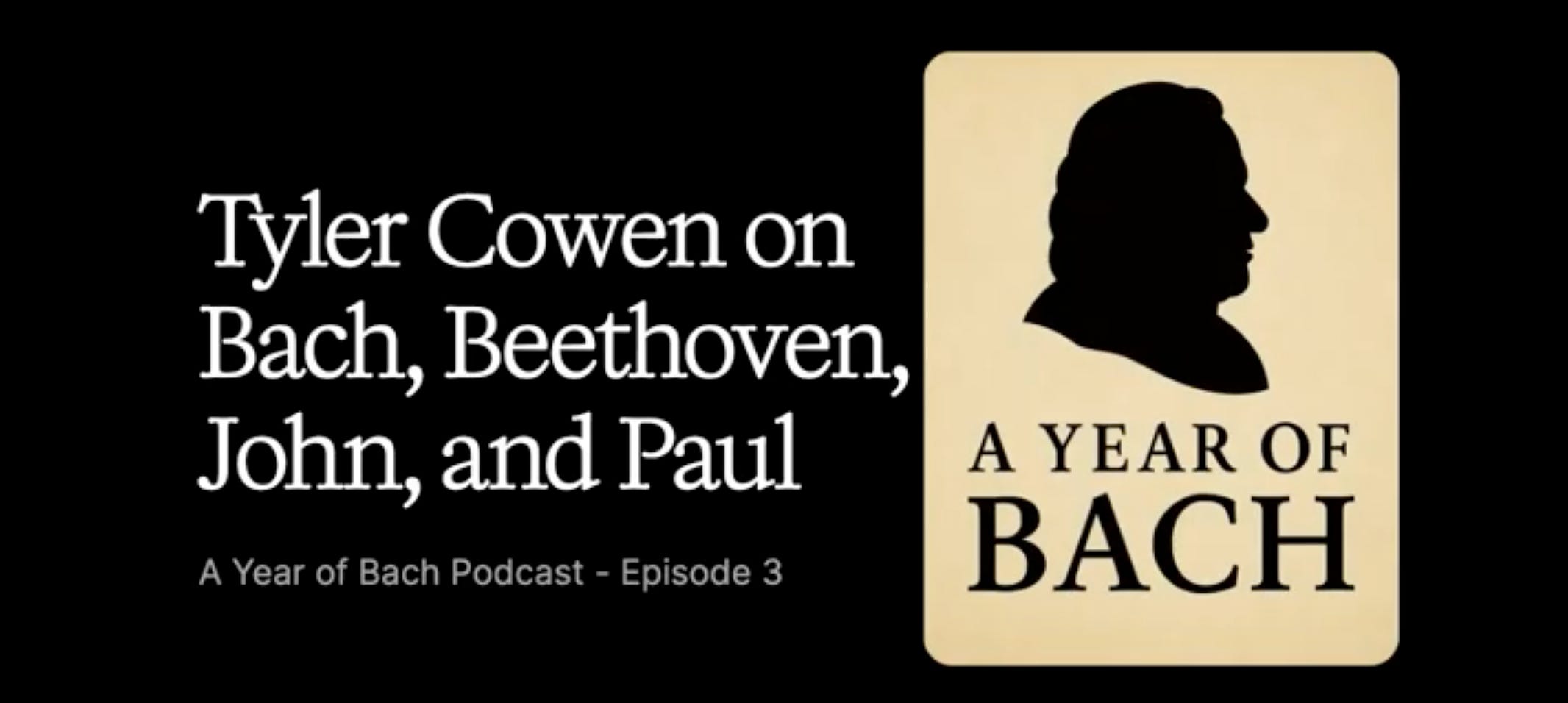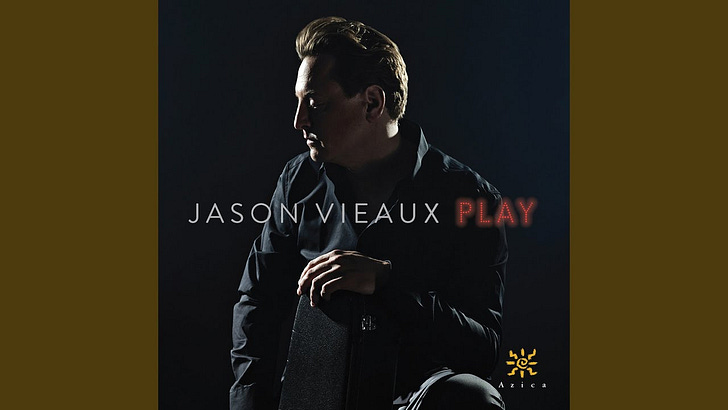FCC Commissioner Reed Hundt on the early Internet, Bach, and "ER"
Description
As Commissioner of the FCC during the Clinton administration, Reed Hundt helped shape the modern internet. We speak about his attending the first Beatles concert in the USA (with his friend Al Gore), and the democratization of publishing and broadcasting wrought by the internet. Reed had many questions for me about Bach and my listening, so this is an episode to hear me talk more than I typically do.
Here’s the video on YouTube.
Transcript below.
[00:00:00 ]
Evan Goldfine: Welcome to the fourth episode of the podcast, A Year of Bach. My name is Evan Goldfine. Today we'll explore how policy helps shape who among us gets to hear Bach in the first place.
My guest is Reed Hundt, who was the chair of the FCC from 1993 to 1997 in the Clinton administration. Highlights from his tenure include the earliest days of digital television and satellite radio, the launch of spectrum auctions, a massive wiring of schools and libraries for internet access, and the opening of the five gigahertz band that became our modern Wi-Fi. He's a longtime public interest lawyer, an early champion of carbon taxation, and a great fan of Bach. And we'll talk about some of those things today. Reed, welcome.
Reed Hundt: Thank you, Evan. Thank you for that very nice introduction.
Evan Goldfine: My pleasure. So, over the past 30 years, the landscape of media reflects one of the biggest changes I think in American life, probably even bigger than the changes from the sixties through the start of your tenure in the [00:01:00 ] nineties.
Even this setup that we're doing right now seems unimaginable. We're on real time, high-definition video with automated captioning. My production budget is zero and the distribution is effectively free to everyone in the world. So I'd like you to reflect on the scale of those changes and maybe some of the things that surprised you about how we got to today.
Reed Hundt: That's a great question. Almost everything that we imagined in the early nineties has come true. And then a lot of other things have also happened that we did not imagine. The things that we imagined were all good things. And the good things have mostly come true. And the things that we did not foresee that were not so good; they’ve happened also.
So those are my two big sets. So, with respect to the first, you've just mentioned a number of really important attributes. All through the first year of the Clinton [00:02:00 ] administration we had weekly meetings hosted by my ninth grade classmate Al Gore, to discuss the vision.
At the beginning of 1994, in January , he gave the first speech ever given by elected official in an international forum about the internet of the future.
If you go back and look at those artifacts, you'll see the things that came true. What, specifically, we wanted to have is that creators like Bach or like you -- I see two guitars behind you on the Zoom screen.
Evan Goldfine: Humbly.
Reed Hundt: -- anyone of any talent, any capability anywhere in the world, at almost no cost could get a chance to see if anyone liked their product.
That came true. We envisioned that for a video. We envisioned it for, for auditory, for music. We envisioned it for typing and writing. and you see all of this everywhere now. We also [00:03:00 ] envisioned that it would be possible to gather an audience for output anywhere in the world, which you're doing right now.
You have very low cost. You still have to figure out how to market, but you have a chance. You don't have to go through a gatekeeper. We didn't sit there thinking we have these ideas, no one else does. The opposite. We had all kinds of people coming and telling us this is what's possible.
And then we adopted. We adopted these ideas as the vision for public policy. You might say, what were the public policies? Number one, we negotiated by the beginning of 1997 a treaty in which 69 countries said they would let the internet come in without taxation.
That's a big deal. Secondly, the spectrum auctions that you were kind enough to mention. Not only did we start the digital cellular industry in the United States, we started it worldwide [00:04:00 ] because in a variety of ways that I won't go into right now because of the shortness of human life, we had it those auctions and the rollout of the same digital technologies for wireless occurring in every country in the world.
And that did actually happen. That is why when Jobs in 2007 got around to inventing the iPhone, there already was an infrastructure there to utilize the iPhone on a global basis, right? It is a chicken and egg story, and you needed to have both the chicken and the egg. so that was the infrastructure part of the story.
Aside from the foreign policy part, we had to make sure that all this connectivity would reach everybody in America at the same time. It wouldn't be, you have a lot of money and then your innovation would trickle down, which is the iPhone business model. It was the opposite.
We wanted to establish the lowest conceivable cost for the new access technologies. To [00:05:00 ] make a very complicated story, I will just summarize in one thing. At one point there were 6,000 internet access providers in the United States. Now you think of just the mega companies, and you're right, there are mega companies. But that's what happened over a 30-year story.
The start was an absolute cauldron of entrepreneurship, which is what we wanted to create. So here you are , you're the avatar, you're the manifestation of all these dreams come true.
There are a lot of horrible things in this new world as well. It turns out you can lie easily. You can lie like a dog on the internet, and everybody believes that you are a human and not a dog.
You can lie at the highest levels of power and authority and get the lies heard all around the world. These things are also possible. We didn't think those things were impossible, but we trusted that ultimately public opinion, if it could be mobilized, would create a better world.
We, I guess we still have to see if that's true [00:06:00 ]
Evan Goldfine: To that end do the major TV and radio broadcasters still matter in this environment?
Reed Hundt: Somewhat, not that much. You asked about public broadcasting. This particular Congress wants to kill anything that has the word public in it. Killing public good as a concept seems to be very, very important to them.
We now are told we don't want the public good of messenger RNA. We don't want the public good of research. Apparently, the government does not want those things anymore. I don't think that's the opinion of most people in America or most people all around the world, but I think it is the animating spirit of this particular administration.
So, what is the case with public broadcasting? Public broadcasting goes back to the 1960s. My great predecessor, Newton Minow, is one of the fathers of the whole concept. The [00:07:00 ] original mission was to have entertainment content that would be in some way enshrining family values, and wouldn't be subject to the constraints of advertising.
That does not actually make very much sense anymore. It's not all that powerful an idea now because again, the internet makes almost everything available to anybody. You can find that kind of content on the Net.
Evan Goldfine: Yes.
Reed Hundt: But what's needed in more volume is non-commercial news. News that isn't dependent on advertisers or beholden to major corporations as for-profit owners, because those corporations can be cowed, intimidated, arm-twisted by the government.
Well, that's been happening. So, there's more need than ever before, in my opinion, for nonprofit news. And I'm not alone in believing [00:08:00 ] that what's publicly broadcast should be reflected in every media. Publicly broadcast news is inquisitive news, investigation and reporting. It’s honesty and reality being presented, not contingent on the business goals of for-profit companies.So, where's that going to come from? This administration doesn't want that to exist. I mean, they've said that. I'm not accusing them of something they haven't admitted. They don't want that to exist. That's going to have to come from a redirection of philanthropic money. And if what we know as public broadcasting is no longer dependent on the government, that's good.
Meaning, now that the government's not a reliable partner, don't deal with them.
Evan Goldfine: Is the audience an issue to capture also in that kind of environment? I mean, you've got to cut through.
Reed Hundt: We do have a public broadcasting TV network that is intrinsically extremely valuable [00:09:00 ] and has stations all across the country.
They're now going to be cash starved. This is a job for philanthropy to do. There's a lot of people in philanthropy that have the wherewithal to step up. It's part of the battle for presenting reality. That's what's necessary. Don't go thinking, oh, we need to get the House of Representatives on our side to cut some deals.
That's not going to happen. And then introduce a modicum of advertising in order to have sustenance. What's important is that the ownership does not have a for-profit motive.
Evan Goldfine: So, you could argue that in a way YouTube's recommendation engine is the single biggest arts promoter in the world now.
Reed Hundt: It's a big deal. Yeah. It's a big deal. Among the many people that I met









